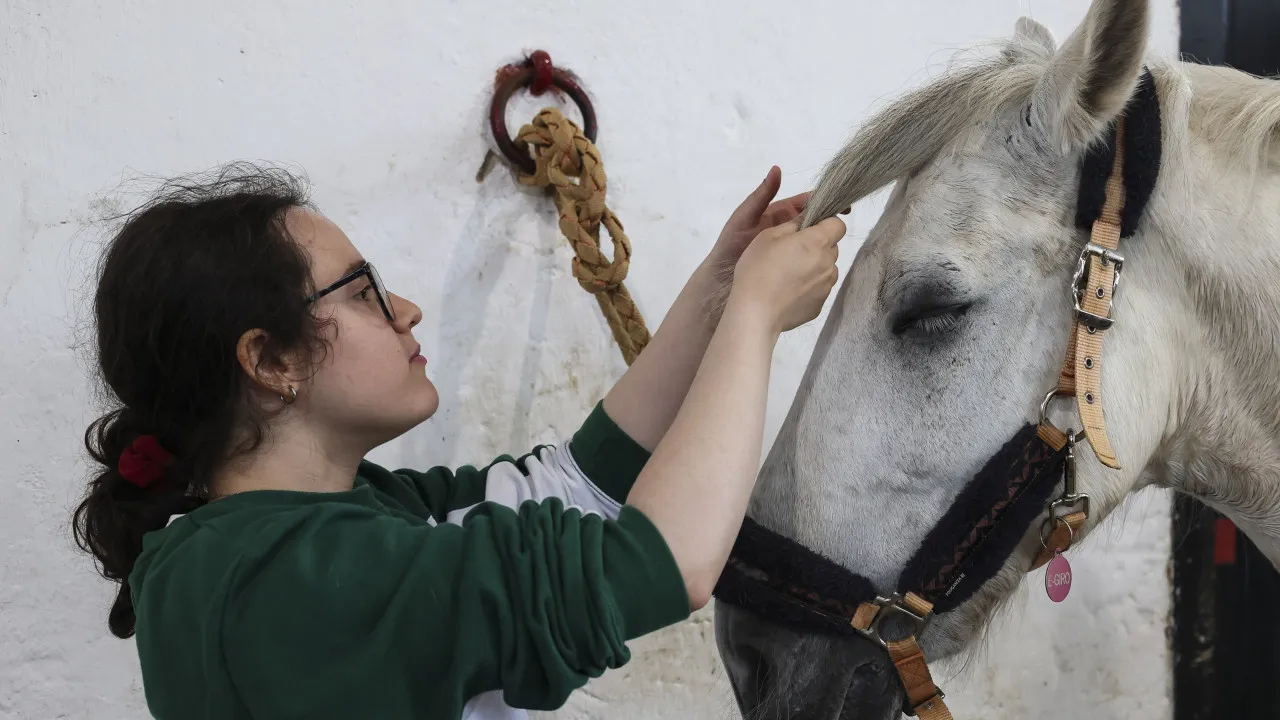With no places in some schools, foreign students are placed administratively. There are already classes with more international students than Portuguese. Principals and teachers are calling for changes to support students and families.
Students with immigrant backgrounds enrolled in public primary and secondary schools have increased year on year. And while this influx serves to counteract the fall in the student-age population, it brings added challenges to schools in an era of a glaring crisis in resources, be they teachers or non-teaching staff. In addition to the shortage or even lack of places in many schools, there is a growing problem: the lack of adequate support for integration. Teachers and school principals point out to DN the need to increase the number of hours allocated to the subject of Portuguese as a Non-Mother Tongue (PLNM) and to invest in the proper specialization of teachers, with the creation of a specific recruitment framework for this subject.
Filinto Lima, chairman of the board of the National Association of Principals of Public Schools (ANDAEP), told DN that “every day foreign students apply to public schools all over the country”. “What I do know is that there are a lot of them and that we already have classes with more foreign students than Portuguese and in the big cities there may be a shortage of places. There are schools where this is a problem and others where it isn’t, but more classes will have to be allowed to open in certain locations, or classes will have to increase beyond the normal number of students, which isn’t ideal,” he explains.
According to the president of ANDAEP, one of the biggest challenges facing public schools today “is to win over these students and welcome them properly, with human and physical resources, with a focus on Portuguese as a non-native language and support for integration and socialization”. “In recent years, we have seen a massive influx of foreign students and, in fact, teachers complain that more hours are needed to meet this challenge. It would be essential to increase the number of hours for PLNM,” she stresses.
Arlindo Ferreira, principal of the Cego do Maio School Group, Póvoa de Varzim, and author of the “ArLindo” blog (one of the most read in the education sector), says that “no school is prepared in terms of human resources and, many, not even in physical terms, to receive foreign students”. “By way of example, I can tell you that in my grouping, in the 1st cycle, I no longer have space in the classes because they are already full. Students will have to go to another school, but the ones nearby are also full,” he says.
Helena Silva, a PLNM teacher at Colégio Júlio Dinis in Porto, shares the same opinion. She believes that there is a lack of specialized teachers to teach the subject, “which would change if a Recruitment Group were created”. “I believe that this trend of an increase in foreign students will continue or even increase. We see it every year. Last year, from 5th to 9th grade, I had around 30 students, next year the number is exponentially higher. It’s therefore essential to create a Recruitment Group because, for Portuguese teachers who are used to the normal curriculum, it’s a big difference. The program is much closer to the 1st cycle than to the 2nd or 3rd. You need specific training and you need to invest. Portuguese is an extremely difficult language to learn and we need to invest in PLNM in order to welcome the children and young people who come to our country,” she explains. The teacher also stresses the need for other support, “as or more important than that needed to overcome the language barrier”. “Schools need a group of teachers, psychologists too, who can integrate these kids and form an appropriate curriculum for them. There are very big culture shocks and it’s very important to have groups with psychological intervention. What’s in the law, in theory, is very nice, but at the start of a school year the school doesn’t know how many foreigners it’s going to have. They have to have someone available for integration and for the communication process. You have to diagnose needs. Many of my students came from public schools, where they were in mainstream education, without much support and integrated into classes without knowing how to speak Portuguese. The legislation needs to be changed as soon as possible, you can’t just put these students in a regular class without any time to adapt,” she warns.
Helena Silva advocates the creation of “separate groups, by cycle and proficiency level, until they are autonomous in terms of communication”. With access to more resources, the school where she teaches has invested in a differentiated program to respond to the increase in foreign students at the institution. “Due to the success of the program started in 2022/2023 (Non-Native Portuguese Program), which follows the national program by cycle and not by year, applied within a maximum period of two years for adaptation for each student, with transition to a regular class in the third year, we are going to continue it,” she says. However, the high number of applications from foreign students and students of Portuguese descent led Colégio Júlio Dinis to create an “international” program. “We realized that several families wanted a different response and we set out to offer an international school. However, in both cases, there continues to be a strong investment in PLNM and we also offer between 4 and 5 hours a week to students at the international school,” he concludes.
Without giving specific figures, Rodrigo Queiroz e Melo, executive director of the Association of Private and Cooperative Teaching Establishments (AEEP), told DN that private schools, with and without association contracts, “are receiving more and more foreign students”.
Filinto Lima stresses the growing importance of the PLNM subject in Portuguese schools and calls for “the promotion of a debate around this issue in order to understand which way to go and whether it is necessary to create a Recruitment Group”.
What the law says
The current legislation for PLNM provides for students at beginner (A1, A2) or intermediate (B1) level to take the subject instead of Portuguese, if the school meets the conditions to set up a PLNM group (there must be a minimum of 10 students). With a minimum of ten students, they are entitled to five hours of PLNM per week. If this is not possible, the decree says, the students will also attend PLNM (they are enrolled in this subject), even if they are part of the Portuguese class, following the PLNM curriculum for the language proficiency levels they are at and may also benefit from PLNM support classes. However, if schools do not have credits available, students may not receive any support.
The legislation also stipulates that schools, “within the scope of their autonomy and educational project”, should provide students with “other activities that foster linguistic immersion, interpersonal relationships, inclusion in the school and a sense of belonging, namely tutoring and mentoring, clubs and school sports”. Something that, according to Arlindo Ferreira, is only possible by investing in human resources. “There is no support at all, apart from an order just for Ukrainian pupils. PLMN support only works, it’s only part of the schools’ credit, if there are 10 students, otherwise it’s taken out of the schools’ credit. Without credit, the available hours are used for PLNM, making it necessary to do without math and Portuguese support for the remaining students. In this way, we don’t provide an adequate response to either one or the other. Last year I had no credits, I asked the DGE for credits and they wouldn’t give them to me. The students were left with very little support, in a group with several levels of proficiency together. And for the rest of the subjects, there’s no support at all,” she laments. The ideal would be “support for the other subjects, with a teacher in the classroom helping to translate the content”. And the support, she explains, should also go to the families, “because many of them don’t know how to speak Portuguese either, they have no knowledge of our culture”.
French pupils rank third in schools
According to data released by the Inequalities Observatory, the 2019/2020 school year saw the highest number of students with an immigrant background, with 156,954 students enrolled, more than 12,000 compared to the previous school year. In percentage terms, it rose from 14.3% to 17.3%. A trend that, according to the school directors, has continued year after year.
According to the Inequalities Observatory, in 2019/2020, “the TOP 5 for attracting students with an immigrant background were the municipalities of Sintra, Lisbon, Amadora, Almada and Cascais”. However, students with an immigrant background consistently increased in the municipalities of Braga and Aveiro. The municipality with the highest proportion of pupils with an immigrant background is Loulé, followed by Vila do Bispo, Aljezur, Loures and Seixal.
The 18 most represented countries of origin are Brazil (28.6%), Angola (13.9%), France (9.5%), Cape Verde (6.3%), Mozambique (4.0%), Ukraine (3.6%), Guinea-Bissau (3.2%), Romania (2,5%), Venezuela (2.4%), São Tomé and Príncipe (2.4%), Germany (2.3%), Moldova (1.7%), China (1.4%), Spain (1.1%), India (0.8%), United Kingdom (0.8%), South Africa (0.7%) and Nepal (0.7%). Students of Nepalese origin saw the biggest increase (1214%). Those of Brazilian origin increased by 119%, followed by Indians (76.6%) and students from Venezuela (61.1%).
Students of Ukrainian, Chinese, Spanish and South African origin also increased, although to a lesser extent. In the opposite direction, with a decrease in the number of students, are the other origins, with the majority from PALOP countries: Mozambican (down 40.7%), Cape Verdean (down 27.4%), Angolan (down 25.8%) and Guinean, which lost 24.8% of its presence in Portuguese schools.








